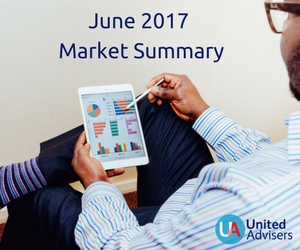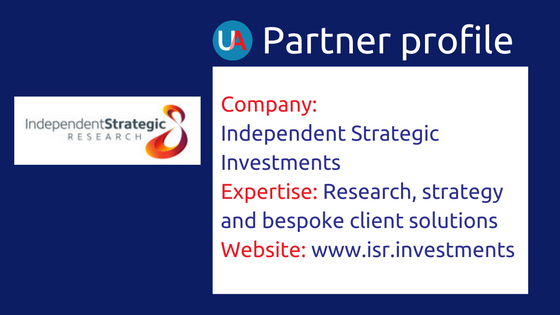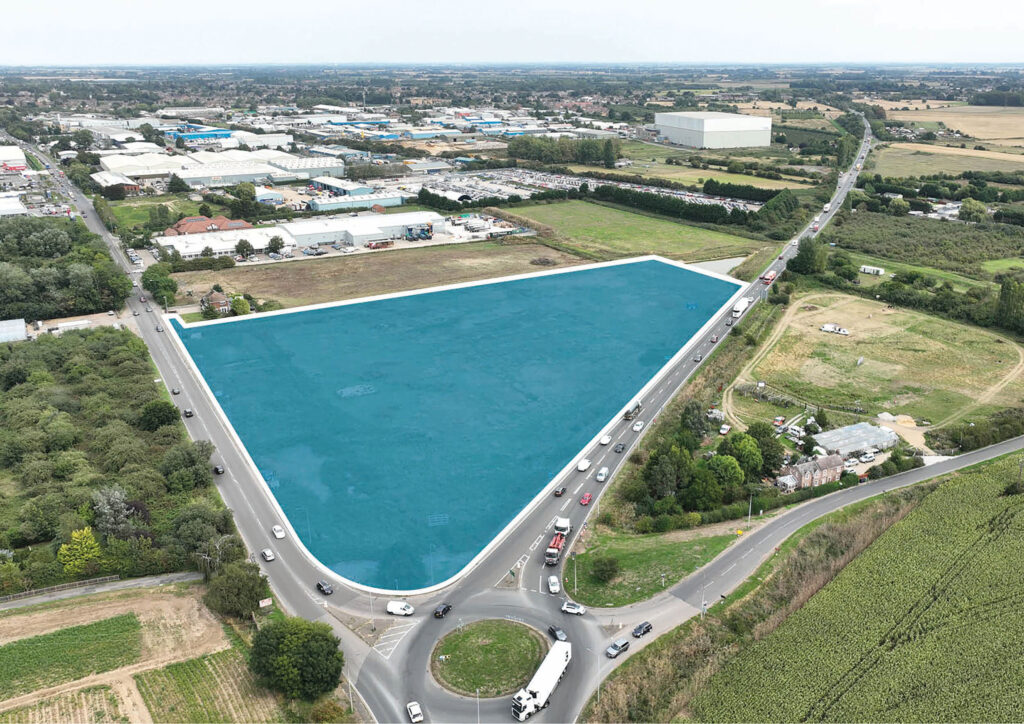In Europe, politics continues to dominate the news. In the UK Theresa May’s election gamble backfired spectacularly, leaving her with a minority Government. Emmanuel Macron, performed as expected and secured a convincing victory in the French Parliamentary elections. Finally, the Netherlands moved closer to forming a coalition Government, after following the March election.
In Japan, Prime Minister Shinzo Abe came under renewed pressure to explain himself following recent cronyism scandals, seeing his approval rating plummet, while, in the US, the Federal Reserve raised interest rates by 0.25% in the face of mixed economic data.
UK
In response to the increased political uncertainty, before and after the election, the majority of conventional and index-linked gilt yields rose throughout the month. The Conservatives have agreed to a deal with the Northern Ireland Democratic Unionist Party. The two parties have established a “confidence and supply” agreement, rather than a coalition.
The Brexit negotiations formally began on 19th June, 11 days after the General Election,. However, it may well be that the real discussions don’t begin until after the summer holidays and the German elections in September.
Before last year’s Brexit vote, there were warnings from many economists that the UK would suffer a catastrophic economic shock. So far, however, these predictions have appeared overly pessimistic, with recent economic data comprising a mixed bag of results.
UK in numbers:
- GDP growth was just 0.2% for the January to March period
- now next to Italy as the slowest growing of the world’s advanced economies
- Inflation for May rose to 2.9%
- Inflation forecast is 3% for later this year
- Savings ratio was at a record low, falling to 1.7% in Q1
- Manufacturers’ order books are at a 29 year high,
- Order books for food, drink, tobacco and chemicals are leading the way
- Export orders are at a 22 year high
- Forecasts for growth over the next three years have increased, and 2017 is now 1.7% from 1.2%
- FTSE 100 index closed the month down 3% at 7,313 as the pound rallied against the dollar, rising to $1.3026
- UK stock market is now up by 2.38% for the year as a whole
Europe
After a positive start in Q2, the rally in European equities finally came to a halt last month, with some of the major indices down over 2%. Mario Draghi’s speech in Sintra led the recent pullback, where the Central Bank chief hinted that the days of the ECB’s aggressive stimulus are numbered.
Market participants interpreted this speech as positive for the ECB’s normalisation policy and possibly indicating a faster withdrawal of the current stimulus programme. On the back of this announcement, the Euro currency continued its positive movement against the Dollar, reaching a 12 month high in June.
Greece finally concluded a second review of its latest bailout, which unlocked vital funds for the country and, once again, kicked the can of default further down the road.
In the Netherlands, the lack of government brought policymaking to a standstill; the result seems likely to be a centre-right coalition. Although Wilders won’t form any part of the coalition, it appears unlikely that the Dutch right wing will merely fade into the background.
Europe in numbers
- Macroeconomic data continues to outperform expectations
- Economies remain on a strong growth trajectory
- Euro area Composite Purchasing Managers Index (PMI) is pointing to its best quarter in over six years
- Economic sentiment sits at a near a multi-year high
- Inflation continues to ease; 1.3% in June, down from 1.4% in May and 1.9% in April.
US
President Trump saw his approval rating continue to plunge in June, with the most recent polls showing a record low of 36%.
President Trump spins his overseas encounters for domestic US consumption to boost his waning popularity, but it will be difficult even for him to put a positive spin on something that is simply not happening.
The Republican Party will be fighting to retain a majority in the House of Representatives in next year’s mid-term elections, and it seems an odds-on bet that the Democrats will take back control.
If the President is going to achieve his campaign objectives, he will probably need to do so within the next twelve months, while he still enjoys the backing of a relatively friendly House.
There was a quarter-point increase in the Fed rate in June with one further increase potentially expected during the second half of the year. Negative wage growth in the manufacturing industry, and barely-positive real wage growth elsewhere in the labour market, plus tighter credit conditions, is leading to falling housing affordability.
These are serious headwinds for the US economy, and although investment is starting to pick up, the consumer is providing a drag on recovery.
There is also more speculation as to how the Fed will seek to shrink its bloated balance sheet, swelled by quantitative easing. The traditional solution to a mountain of government debt is, at least in part, to inflate it away. Raising rates will not help, especially with inflation already faltering; May’s figure of 1.9% was down 0.3% from the previous month.
US in numbers:
- Industrial production continued to improve +2.2% (YoY) in May (+2.1% in April)
- Production rise driven by mining and manufacturing
- The US PMI increased to 57.8, from 54.9 in May, exceeding the consensus expectation of 55.2
- Fifteen out of eighteen manufacturing industries reported growth in June
- Large-cap equities gave a positive return of +0.3%
- Amazon and Alphabet (Google) saw their share prices rise above $1000, only to be followed by a spate of selling
- Sale of the tech “FANG” stocks left them down on the month
- Small-cap stocks fell by 2.6%.
- US Treasury stock performance ranged from a marginal +0.1% in the under-one-year stocks to +1.0% for the 30-year issues, with average returns across the curve amounting to -0.1%
- Investment Grade corporate bonds returned +0.3%
- High Yield corporates were flat.
Asia Pacific and Emerging Markets
Japan
June was another strong month for Japanese equity markets as foreign investors continued to allocate capital to the country.
The benchmark TOPIX index rose around 3.0% in Yen terms, and Japanese equities outperformed their developed market peers by around 0.7%. Financials drove Equity market performance as the major Japanese banks, Mitsubishi Financial, Sumitomo and Mizuho; all continued to recover from earlier fears that negative rates would damage their profitability.
Positive equity market performance was partly due to weakness from the Yen, which fell around 1.0% against the USD and 2.6% against the EURO. The Bank of Japan sounded a positive note on the economy, noting resilient private consumption and export growth.
Japan in numbers:
- Equities slightly lag other developed equity markets
- Quarterly GDP growth is at +0.3%,
- Yearly export growth is currently +14.9%
- Japan PMI data is below expectations
- GDP growth over the past year remains positive, with both private demand and net exports contributing
- The job market remains robust with the jobs- per-applicant ratio continuing on an upward trajectory
- Bank of Japan held interest rates at -0.1%, and broadly maintained the asset purchase
Emerging Markets
Emerging markets had a robust month as investors continued to add to emerging market equities, which rose 1.6% in local currency terms, 0.6% ahead of developed markets.
On a country-specific basis, China and Taiwan were the strongest performing major markets, rising by 2.3% and 3.8% respectively.
In politics, Brazil’s top prosecutor charged Brazilian President Michel Temer with accepting bribes; an event Brazilian markets may have anticipated because the benchmark Bovespa index rose around 0.3% in June, following a sell-off in May.
Events in the Middle East were also notable as Saudi Arabia, Egypt, Bahrain and the UAE severed ties with Qatar, where markets fell close to 10%. Qatar’s neighbours accuse the country of funding terrorism and destabilising the region; a claim denied by the Qatari Government.
Emerging markets in numbers:
- Equity market performance was driven by the tech giants, with Samsung (+6.4%), Tencent (+4.3%), Taiwan Semiconductor (+6.2%) and Alibaba (+15.1%) all experiencing a sharp increase in share prices.
- Year-to-date emerging markets have outperformed developed markets by around 7.8%
- Economic news was mostly positive as GDP data for South Korea and Brazil came in slightly above expectations
- Economic data for China also surprised with the manufacturing PMI coming in at 51.7 and exports rising 8.7% over the year
- Argentina sold off $US 2.75bn of 100-year bonds at a coupon of 7.125%, just one year after its latest default. The sale was substantially oversubscribed as a 7.9% yield in a low-interest market tempted long-term
If you want to read the full market commentary provided by our partners you can do so by clicking here [download id=”2674″]





